Sedation Dentistry - Midland, TX
Say Goodbye to Dental Fears
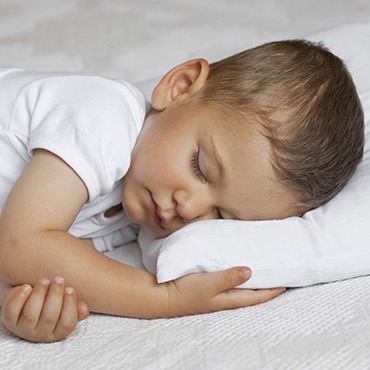 At Midland Kid’s Dentist, we’re invested in helping your child have a positive relationship with oral health care from the very beginning – in fact, we hope that they’ll start looking forward to their appointments here with our team! However, we also understand that for many young patients, fear and anxiety can still make this necessary process difficult. Additionally, some children may be too young to sit still under their own power, or they may have special needs that require accommodations. In these cases, our dentist offer safe and effective sedation dentistry that can create a much more relaxed environment for your loved one. Please contact our location in Midland, TX if you have any further questions, or if you’re ready to schedule an appointment.
At Midland Kid’s Dentist, we’re invested in helping your child have a positive relationship with oral health care from the very beginning – in fact, we hope that they’ll start looking forward to their appointments here with our team! However, we also understand that for many young patients, fear and anxiety can still make this necessary process difficult. Additionally, some children may be too young to sit still under their own power, or they may have special needs that require accommodations. In these cases, our dentist offer safe and effective sedation dentistry that can create a much more relaxed environment for your loved one. Please contact our location in Midland, TX if you have any further questions, or if you’re ready to schedule an appointment.
Who is a Good Candidate for Sedation Dentistry?
When determining whether your child is a good candidate for sedation dentistry, it’s important that you first schedule an appointment with our dental team. It is during this visit that we will go over their medical history as well as whether they are taking any current medications. This will give us better insight into whether one particular form of sedation will be better than another.
However, if your child suffers from the inability to sit still for long, has a fear of needles, has past dental trauma, or dislikes the sounds, smells, and sights of a dentist’s office, there is a good chance they will be recommended for sedation dentistry.
Oral Liquid Sedation
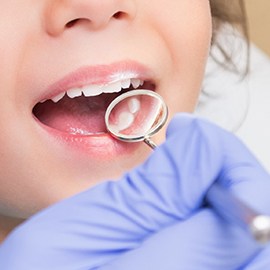
Oral sedation is a frequent recommendation from our team, and it is very effective in helping patients feel genuinely calm and at ease. A variety of liquid medications are available for this purpose, and we will be sure to discuss the potency of the medication, the potential side effects, and what to expect beforehand to parents once we’ve recommended a certain option. Please make sure that your child is dressed comfortably for their procedure and that they don’t eat anything after midnight on the night before. Afterward, it is very likely that they will feel tired and fall asleep. In this case, it’s a good idea to help them lie down on their side with their chin up so that, if they become sick, they won’t choke.
What is Oral Liquid Sedation?
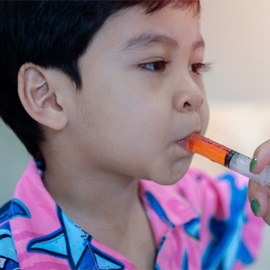
To help children feel relaxed and comfortable during dental procedures, oral liquid sedation is an effective method that’s often used. It involves administering a liquid medication, usually a sedative or anti-anxiety medication, in a controlled dosage based on the child's age, weight, and dental needs. The medication is typically flavored to make it more palatable for children. Not only does it help minimize anxiety and discomfort, but it allows children to remain conscious and responsive throughout the procedure. It helps create a calm and cooperative environment, allowing the dentist to perform necessary treatments while ensuring a positive dental experience for the child.
How Does Oral Liquid Sedation Work?
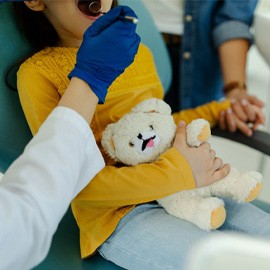
If your child is feeling nervous about their upcoming appointment, they will be prescribed a liquid medication to take before their procedure. Once ingested, the medication takes effect, inducing a state of relaxation and reducing anxiety. Although your child will remain conscious throughout the procedure, their fears and discomfort are significantly diminished. Close monitoring of their vitals is maintained to ensure the child's safety and well-being. It may take several hours for the effects of the sedation to wear off, which means your child should take it easy for the rest of the day.
Is Your Child a Good Candidate for Oral Liquid Sedation?

Determining whether or not your child is a suitable candidate for oral liquid sedation involves a comprehensive evaluation by our team. We typically recommend it to our young patients who:
- Suffer from mild to severe dental anxiety or fear
- Have a strong gag reflex
- Require complex or lengthy dental procedures
- Have physical or developmental disabilities
IV Sedation

IV sedation is sometimes a good option for kids with strong dental anxiety or who need to undergo a particularly complex or lengthy treatment. With this method, we administer a sedative directly into the bloodstream via a needle on the patient’s arm or hand. We can closely control the level of sedation throughout your child’s procedure so they stay comfortable. We also take all necessary safety precautions to minimize the risk of adverse side effects and complications.
What Is IV Sedation?

IV sedation is administered intravenously, directly into the bloodstream. It takes effect very quickly and is powerful enough to help even some of the most nervous or restless children. It dulls the senses and induces a very deep state of relaxation. IV sedation is sometimes called “twilight sedation” because even though it does not cause unconsciousness, patients might feel as if they are asleep. They are unlikely to remember anything about the procedure after the medication wears off.
We carefully monitor each patient’s blood oxygen levels, heartrate, and other vital signs the entire time they are under the influence of IV sedation.
Who Is a Good Candidate for IV Sedation?
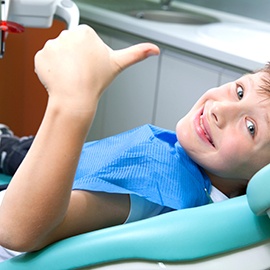
We may recommend IV sedation for children who:
- Need to undergo an especially lengthy or complex procedure.
- Struggle with moderate to extreme dental anxiety or fear.
- Have special needs, such as a mental or physical condition that makes it difficult for them to sit still for extended periods of time.
- Are not easily numbed by local anesthesia.
Before approving your child for IV sedation, we need to learn about their medical history so we can be sure that it is a low-risk option for them. For example, it is not generally suitable for individuals with certain respiratory conditions.
The Benefits of IV Sedation

IV dental sedation kids in Midland can provide several benefits:
- It can help some of the most anxious children to enjoy easy dental care. (It is even more powerful than nitrous oxide and liquid conscious sedation.)
- It is often a great option for special needs kids who would not otherwise be able to tolerate dental procedures.
- Patients are unlikely to remember their procedure, so it can prevent the formation of traumatic memories.
- We can adjust the level of sedation in order to keep patients calm, relaxed, and comfortable.
- It is safe for most patients.
Nitrous Oxide Sedation
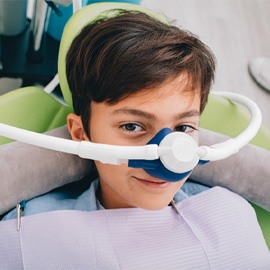
Nitrous oxide, more commonly known as laughing gas, is a mild sedative that’s excellent for older children and teens who feel anxious or fearful when visiting the dentist. It allows them to relax in the treatment chair and have a more positive experience, and because the effects wear off quickly, your child will be able to return to school or any other responsibilities right after their appointment. Our team at Midland Kid’s Dentist exercises all safety precautions to make sure your favorite smile has a comfortable experience.
Is Nitrous Oxide Safe for My Child?

When administered by professionals like our team at Midland Kid’s Dentist, you can trust that your child will remain safe and comfortable while in our care. We typically recommend this method of sedation for children who are undergoing more extensive dental work, like receiving a dental filling or crown, or those who experience fear or anxiety at the sights, sounds, and smells of the dental office. Our team will monitor your child throughout their procedure and can adjust the sedation accordingly during their appointment.
How Does Nitrous Oxide Work?
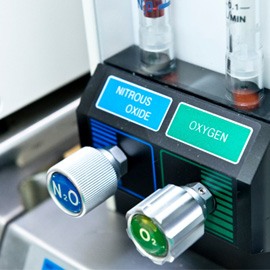
Nitrous oxide is administered through a small nose mask that we apply before we begin treatment, making it a great, needle-free solution! Once the mask is secure, we’ll turn on the mixture of gas and oxygen, allowing them to breathe it in so they can benefit from the effects. Within moments, your child will feel a calming wave that will help them feel at-ease in the treatment chair and make their time with us fly by!
Parent Aftercare for Nitrous Oxide Sedation

The effects of nitrous oxide wear off quickly, so most children are able to return to their regular schedules right after their treatment. We’ll request you and your child to remain in our office for a few minutes after we remove their nitrous oxide mask to make sure that it’s safe for you to take them home. If they received more extensive treatment, they may have separate recovery instructions as well. If you notice anything unusual or have concerns, please don’t hesitate to call our office so we can help put your mind at rest and ensure your little one is safe.
Hospital Anesthesiology
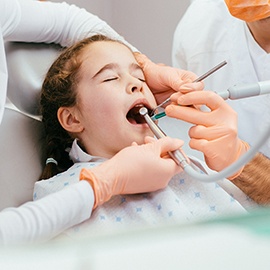
If full unconsciousness is truly necessary, our team will work with highly trained anesthesia providers at a nearby hospital to create the safest environment possible for your child’s care. Our dentist typically only recommend this method for overly long or complicated procedures that cannot be performed safely under milder sedation or if the patient has special needs or highly severe fear/anxiety.
What Is Hospital Anesthesia?
Hospital anesthesia enables our team to handle the most complicated dental cases with relative ease. A licensed anesthesiologist will give your child a mix of medications that will help them fall and stay asleep throughout the procedure. The reason we do this in a hospital is because it has equipment we don’t have in our practice, such as everything the anesthesiologist needs, plus there are instruments that allow us to monitor your child’s breathing and heart rate during a procedure. This way, we can avoid complications while our dental team does its work.
Who Is a Good Candidate for Hospital Anesthesia?
This method is best for children with special needs that make them non-compliant (to the point of being terrified or combative) when receiving dental treatment, and it’s also good for those who need more involved/surgical procedures that may take a long time. We will talk through all of their sedation options with you beforehand so you can decide on what is right for your child.
The Benefits of Hospital Anesthesia
- In the Hands of Experts: Your child will be paired with an anesthesia specialist who will know how to sedate them fully while using the minimal amount of medication possible.
- A Calmer Experience: Rather than forcing a frightened child to endure a traumatic dental visit, hospital anesthesia allows everyone to relax while your child sleeps.
- Safer: When a child resists during dental treatment, it makes the situation less safe for themselves and our dental team. With this approach, there is much less to worry about.
- Timesaving: We can complete multiple complex procedures in a single appointment with hospital anesthesia, helping everyone save time and needless trips back and forth.
Sedation Dentistry FAQs

Does your little one typically get nervous when it comes to visiting their dentist? They aren’t the only ones. Most patients struggle with dental-related fears or anxieties, causing them to hesitate to get their teeth treated. For this reason, our team offers a few methods for helping your child remain as comfortable and relaxed as possible while they’re in the dentist’s chair. To know more about these options, here are several of our most commonly asked questions about sedation dentistry in Midland. If you’d like to learn more or don’t see the information you’re looking for, give our team a call for help!
Is Sedation Dentistry Safe?
Most sedation dentistry treatments are completely safe for patients. Of course, nitrous oxide is typically considered harmless for the majority of people, as it can simply be breathed in during their appointment and the sedative can wear off within a few minutes. Rest assured, our team will first evaluate your child’s oral health and medical history to determine which method of sedation would work best for them. The last thing we would want is to encounter any issues or complications while your little one is receiving treatment. We’ll also have a qualified team member monitor your child’s vitals throughout the entire visit to ensure that they’re safe.
How Long Does Dental Sedation Last?
This will depend on the kind of sedation that your little one receives. Of course, nitrous oxide will usually only last until our team stops administering it. Within a few minutes of not inhaling the gas, our patients should feel back to normal and able to continue their normal daily schedule. Oral liquid sedation, however, can take several hours for the effects to finally wear off, as it is a more powerful form of relaxation. If your child receives this method, it’s best to have them rest for the remainder of the day after their appointment is over.
Will My Child Remember Anything with Dental Sedation?
With nitrous oxide, your little one will simply feel comfortable and stress-free. They should also be well aware of the activities in the dental office and can respond to questions from their dentist like normal. On the other hand, oral liquid sedation is more powerful and can induce a more euphoric or dream-like state. Although your child will technically be conscious during their visit, they may feel as though they’re sleepy and won’t remember much about their treatment. The only thing they’ll recall is an incredibly pleasant experience at their dentist’s office!
What Are the Risks of Sedation Dentistry?
Sedation dentistry can still pose some risks for certain people, which is why our team thoroughly assesses our patient’s oral health and medical/dental history before administering anything. Some people can react differently to particular sedatives and local anesthesia. A few side effects from sedation treatment can involve headaches, grogginess, and nausea, which can last a few hours after the appointment. Those who struggle with obstructive sleep apnea or take certain medicines can also be more likely to have complications with this form of dentistry.
What should my child bring to their appointment?
When arriving for their appointment, it can be helpful to make sure that your child has something that reminds them of home. Whether this is a blanket or their favorite stuffed toy, it can help to keep them comfortable while waiting for the sedation to take effect. You will also find that remaining upbeat and positive about their appointment when speaking to them can help alleviate some of the nervousness a child might experience.
Are there any side effects associated with sedation dentistry?
Depending on the type of sedation dentistry a child receives, they may or may not experience any side effects. Most will have your child feeling sleepy after their appointment, in which, you’ll want to make sure that they get plenty of rest.
With oral liquid sedation, it can be helpful to keep their chin lifted while asleep on their side in case they experience any nausea or vomiting.
With nitrous oxide, your child will be free to resume normal activity, as there is little chance that they will experience any side effects after treatment.
For those receiving hospital anesthesiology, you’ll need to remain with them to ensure that the anesthesia wears off and that they get adequate rest following their procedure.
